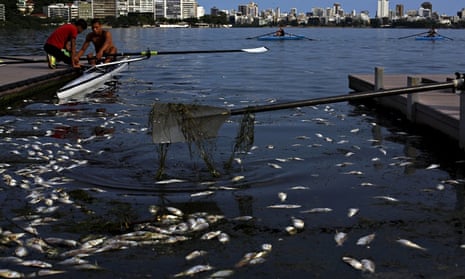Below the open arms of the statue of Christ the Redeemer, and not far from the upmarket neighbourhood of Ipanema, the Rodrigo de Freitas lake is usually a popular spot for Rio’s cyclists, joggers and coconut sellers.
But over the last few days the air around the lake has been pervaded by the stench of rotting fish.
“The smell has been really unbearable,” said Teresa Rafaela Campos, 50, a resident of Jardim Botânico, one of the neighbourhoods next to the lake. “It makes you want to vomit.”
Over the past week, 42.9 tonnes of dead fish have been retrieved from the lake that is due to host the rowing events for the 2016 Rio Olympic Games.
Comlurb, the city’s waste management company, has dispatched a team of 62 refuse collectors to remove the fish from the Rodrigo de Freitas lake.
According to Rio’s environmental secretariat, the fish were killed due to thermal shock. Heavy rains last week caused the levels of sea water to rise; some entered the lake, resulting in a four-degree change in temperature in a short space of time.
But Paul Rosman, an oceanographer who works at the lagoon, told Reuters that an increase in algae blooms, caused by the presence of sewage, had led to a buildup of carbon dioxide in the water. He said the local government had disregarded a proposal to dig extra canals to the sea to enhance the quality of the water.
It is not the first time the lake has been filled with dead fish. Two years ago, 65 tonnes were retrieved from the water over the course of a few days.
Carlos Eduardo Prazeres, 58, a sweet-seller who has been working the lakeshore for 50 years, said it did not use to happen as often. “There’s so much pollution in this lake now, with open drains that flow into the water. There doesn’t seem to be anyway of stopping it.”
Mário Moscatelli, a biologist who has worked to protect the mangroves in the lake, said there was a lack of effective environmental management of the area.
Moscatelli said that the city had no contingency plan for situations like this, meaning that a thermal shock that might have killed a small number of fish ended up killing many.
“After the clean-up, the bad smell goes away and then they forget about the problem until the next time,” he said.
Water quality is a particular concern for city authorities ahead of next year’s Olympic Games. Rio de Janeiro’s mayor, Eduardo Paes, recently admitted that the city had “wasted” an opportunity to clean up the Guanabara Bay, where the sailing events will take place. Still, he has insisted the water will not pose a health risk to athletes.
Ms Campos, taking a brief break from her bike ride to enjoy some coconut water by one of the less smelly sides of the lake, said she was not worried that the dead fish phenomenon would affect visitors’ enjoyment of the Olympics.
“The Olympics is going to be a big success,” she said.







Comments (…)
Sign in or create your Guardian account to join the discussion